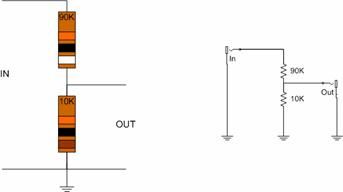I’d like to send triggers from my eurorack into one channel of my axoloti audio in. Any chance this could damage the axoloti? Might be 12V pp, might be with a DC offset included...
Will DC in line in damage axoloti
very high chances. Axoloti supports up to -/+ 3.3 vpp in the audio ins . probably tolerates a bit more but not so much.. maybe there is a way in which you can attenuate the signal up to max 3 v before going into the axo.
I'm not completely certain this is what happened, but I might have damaged a Axo Core by running 9V into it by accident (TIL: keep your differently-powered breadboards separate! I should be able to at least know if that's what happened!)
You'll have to attenuate the voltage somewhere. Fortunately, since you're not running real current through it, doing so is literally a two-resistor circuit! run a 3kΩ resistor from signal input to your incoming signal line and a 1kΩ resistor from the incoming line to ground! It's the ratio between them that you want:
incoming voltage(12) - input voltage(3.3) ≊ 9
~9 : ~3 ≊ 3 : 1
Put the bigger resistor (3.3kΩ) where you need to reduce the input (between cable and input) and the smaller resistor (1.1kΩ) where you want most of the voltage to push.
If you want your signal more precise, measure resistors around those values until you find a combination that comes out closest to 12:3.3, a ratio of 3.63:1.
Note: this technique only works for voltage control, not current. If you try drawing more than trivial current on these, you'll either burn out the resistors or you'll wind up having to use huge resistors that radiate that heat away into your gear, and you'll have to deal with all the heat. There are much better ways to attenuate power.
(If I'm wrong about any of this, please let me know! I turn terms backward and upside down all the time!)
Here's a voltage divider that reduces voltage by 90%, where you want to reduce it by 84%. Adjust your values to suit. Depending on the resistors you have onhand, you might literally have an 8.4kΩ and a 1kΩ, since those are reasonably common!

